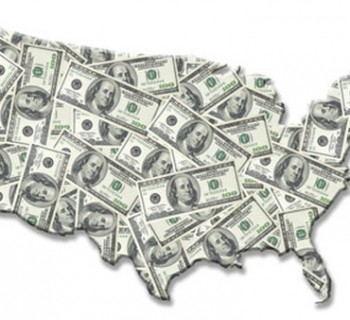 According to research from the University of Scranton, nearly 45 percent of Americans will make a New Year’s resolution this year. However, making a resolution is the easy part – sticking to your resolutions and using them as a springboard to transform your life is more challenging. After goals for health and wellness, financial resolutions are usually the next most common goal for the New Year. Taking a proactive approach to improving your finances may help you to feel more empowered, reduce stress and improve your overall quality of life in 2019. Consider following these smart money moves for the New Year.
According to research from the University of Scranton, nearly 45 percent of Americans will make a New Year’s resolution this year. However, making a resolution is the easy part – sticking to your resolutions and using them as a springboard to transform your life is more challenging. After goals for health and wellness, financial resolutions are usually the next most common goal for the New Year. Taking a proactive approach to improving your finances may help you to feel more empowered, reduce stress and improve your overall quality of life in 2019. Consider following these smart money moves for the New Year.
Avoid the behavior gap
2018 was an extremely volatile year that tested the emotional fortitude of investors. In fact, many investors struggled as some high-flying stocks ended up in bear market territory by year-end. These peaks in volatility tend to test investor discipline, often leading to panic.
Making the wrong investment decisions at the wrong time can lead to what is referred to as the behavior gap (a popular concept in finance to describe how emotions can negatively impact investment returns). Whether it be chasing returns and buying high or bailing on a long-term investment strategy and selling low, investors may implement destructive behavior when making investment decisions - especially when things get emotional.
When was the last time your portfolio was rebalanced? Have you updated your financial plan? Unfortunately, many investors end up maintaining the same portfolio for years without making adjustments to bring their investments into alignment with where they are in their life today. Try to do your best to avoid making reactionary moves that are based upon emotion. Remember - trying to time the market can make things worse for the average investor, so do your homework prior to making any sudden changes and stick to a disciplined investment approach that is based upon your unique goals.
Make the most of your cash
With interest rates continuing to creep higher with each Federal reserve rate hike, it is no longer acceptable to be earning nearly 0 percent interest on your cash. The New Year can be a great time to re-visit your cash reserve strategy.
When it comes to investing cash, boring is good. After all, cash reserves are not supposed to be exciting. Instead, a true cash reserve is generally going to be liquid, contain no risk and maintain FDIC insurance coverage. Savings accounts, CDs and online savings or direct banks are all popular options, and shopping around online can help you uncover institutions offering higher rates. Interestingly, the banking industry is one where size and scale does not necessarily equate to better rates, so consider visiting www.bankrate.com to determine which banks offer the most attractive rates. FDIC insured direct banks such as Citizens Access, CIT and the like may offer higher rates of interest than conventional banks. Additionally, setting up a laddered CD strategy using the direct banks noted above may help increase your yield over time as rates move higher.
Review your liabilities and credit score
The Federal Reserve hiked interest rates again in December and many analysts believe interest rates may continue a bit higher in 2019. This hike represented the ninth rate increase since the Fed began to raise rates in December of 2015. From mortgage rates and home equity lines of credit to student loan interest and credit card debt, the New Year is an important time to review any liabilities you have.
First, be sure to review your credit score to obtain an overall snapshot of your debt and credit scores, noting any excessively high interest rate debt you may have. Next, consider exploring lower interest balance transfers, fixing variable rate date and developing a payment plan that emphasizes paying off the highest interest debt first. Remember, the ‘I’ll refinance later approach” to dealing with debt may no longer be feasible today. Consider developing a game-plan to address your debt and improve your credit in the New Year.
Reduce financial waste
Many Americans end up with excess or unnecessary expenses that often slip under the radar and go undetected for months or even years. This is particularly true due to an increase in the auto-renewal of various monthly and annual subscription services that may be buried in your credit card statement. Consider reviewing your budget and cancelling any services/subscriptions that you are not utilizing. (think technology subscriptions, gym memberships, etc. ) Next, consider reviewing your cable, internet and cellular bills to renegotiate/switch service providers to reduce fees. Many providers offer short “teaser rates” that suddenly jump up after the introductory period is over which often go unnoticed.
Auto insurance and homeowner’s insurance is another great place to look to see if there are cheaper alternatives available. However, be careful to make an apple to apples comparison as another carrier may be cheaper simply because they are providing inferior coverage.
Finally, be extra careful with big ticket purchases. From home and auto purchases to home renovations, being a savvy consumer can end up saving you serious money in the long-term. Remember, reducing unnecessary expenses and increasing savings is a great way to propel you toward your future goals.
Developing financial resolutions based upon your unique goals can be a powerful exercise. Consider addressing the Smart Money Moves noted above and consider speaking to your financial adviser to determine the most appropriate approach for your unique circumstances.
Kurt J. Rossi, MBA, CFP®, CRPC®, AIF® is a CERTIFIED FINANCIAL PLANNERtm Practitioner & Wealth Advisor. He can be reached for questions at 732-280-7550, kurt.rossi@Independentwm.com, www.bringyourfinancestolife.com & www.Independentwm.com. LPL Financial Member FINRA/SIPC.









